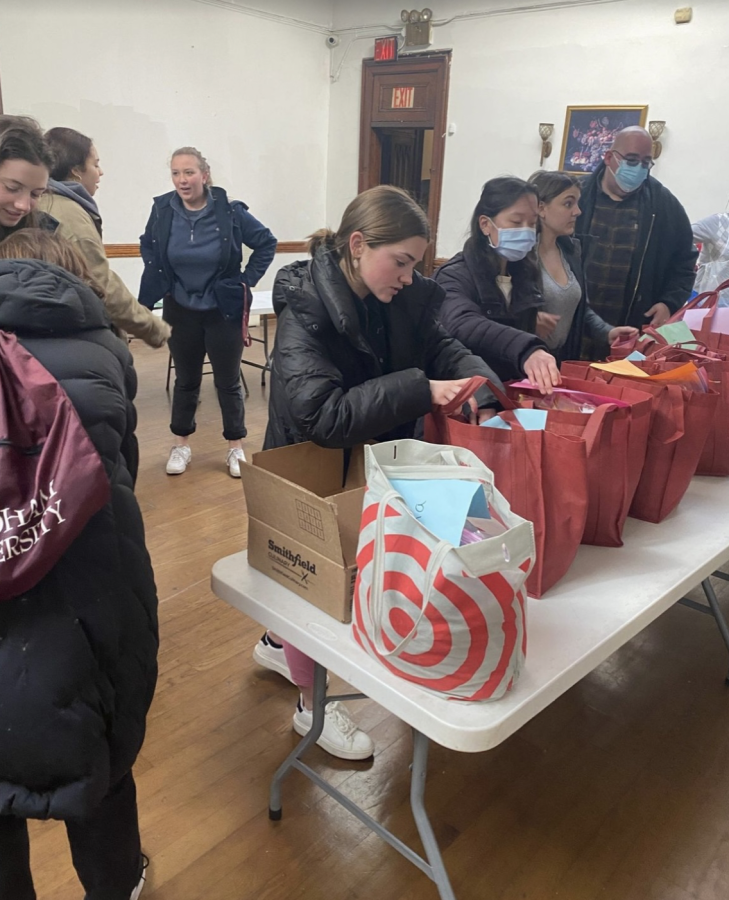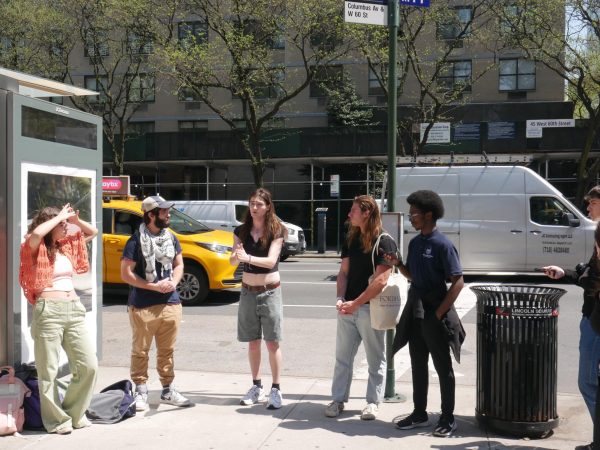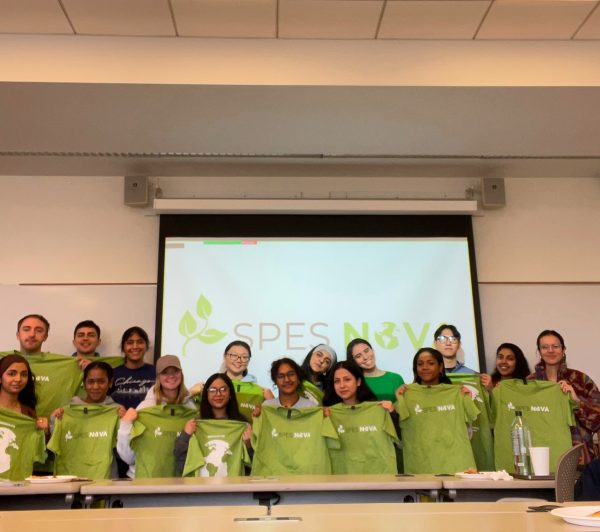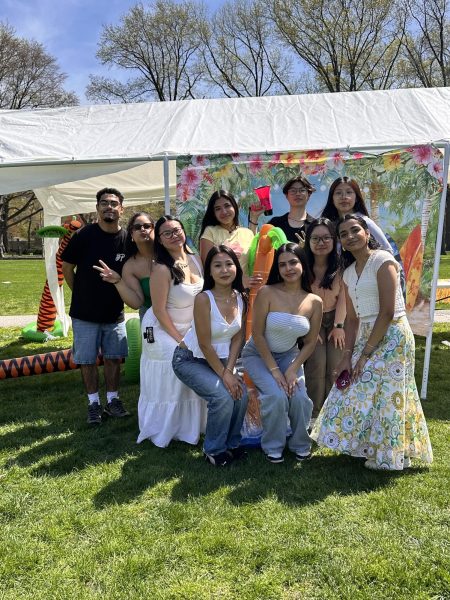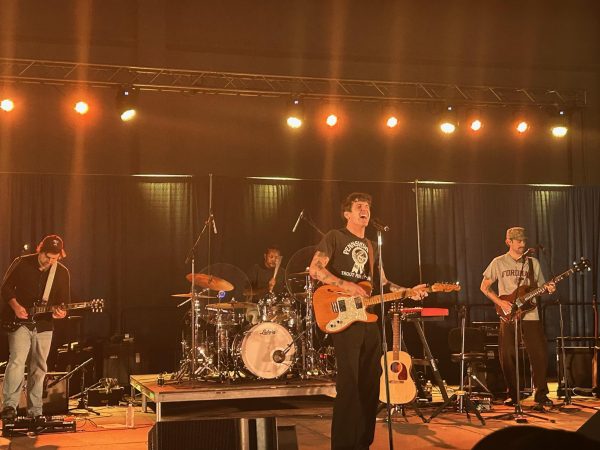Office of Mission Integration & Ministry Hosts Food Insecurity Event
This past Monday, Feb. 13, the Office of Mission Integration & Ministry held a food insecurity reflection at Rose Hill by packing 250 meals for neighborhood community fridges and an Ignatian Reflection from 1-2:30 p.m. This event is one of the projects/programs partnered with Pedro Arrupe Volunteers (PAV) under the Office of Campus Ministry, available to all students to participate throughout the year. It is held on both Rose Hill and Lincoln Center campuses and is an opportunity for undergraduate and graduate students to execute meaningful service. The program shares the vision of General Pedro Arrupe, “Men and women for others,” refocusing education to impact our world.
Robert Parmach, director of mission integration & ministry, Ph.D., and Vanessa Rotondo, associate director of campus engagement and senior advisor for Ignatian leadership, talked about the event and explained the course of this program.
“This past Monday afternoon, our Mission-in-Action Sandwich Making program harnessed the spirit and energy of 40 undergraduate and graduate student volunteers with collaborators Dean Chelsea Smith of GSAS and graduate student Faaria Fasih-Ahmad as part of their student development office’s Wellness Week initiative,” said Parmach.
“While having fun listening to some motivating ‘80s music, we all made 250 meal packs for local community fridges and POTS (Part of the Solution) organizations. We grounded the day’s program in the theme of gratitude and had a brief reflection on how Ignatian imagination affects our attitude and habits,” said Parmach. “A similar Mission-in-Action Sandwich Making program was recently organized at the LC campus where graduate and undergraduate students, staff and faculty participated, and the meal packs were distributed to neighborhood community fridges on 102nd Street & Columbus Avenue. It’s inspiring to see Fordham community members who care and participate in meaningful collaboration while developing their interior lives.”
Rotondo emphasized the differing population it is hosted to, including the school of business and other communities within the university.
Rotondo said, “Really why we do it is it calls persons to the broader experience of hunger in our immediate community and we deliver to community fridges. We rotate fridges so it’s not the same one but we do meal kits. We do a drink, snack, sandwiches and note of affirmation to let recipients know someone from Fordham was preparing meals with love, wishing them well and have a good day wherever they are and whatever circumstance may be.”
When the program is held on Rose Hill campus, meal kits are distributed to fridges in the Bronx. Lincoln Center collaborates with Harlem and surrounding Manhattan fridges expanding to the Upper West Side as well. These programs aim to call students, faculty and staff to mindfulness of understanding who this possible recipient could be and one’s contribution through thought fullness.
“When we have students preparing meal packages, it’s not rare to get done in [a] short amount of time. It’s a call to be mindful as you prepare meals. As said before, embodied love to understand who you are in that space-journey of self discovery, in [the] process making you feel, but being able to think about the person who is receiving it. Is it somebody who is in need of food keeping that person in mind as you’re preparing a meal realizing that whatever you think whatever the circumstance are even if receiving with that kind of aspect to it as well,” said Rotondo.
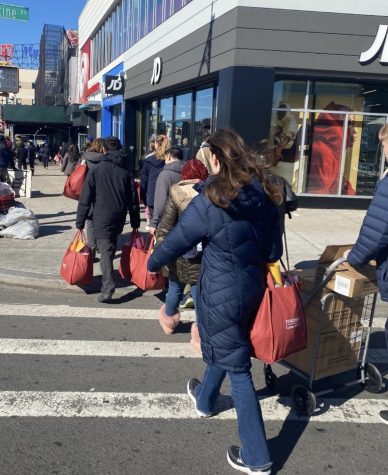
“[It is] a great opportunity to spend time with new people and contribute positively to the broader Bronx community. Participating in events like sandwich-making reminds me how important and rewarding it is to turn my values into actions and do work that materially improves people’s lives, even if it’s something very small like having an after-school snack,” said Olivia Tafs, FCRH ’24.
“My one hour or hour and a half of making sandwiches will make a legitimate difference in someone’s life. It means a kid gets a snack bag for the park. It means someone who maybe hasn’t had a fresh meal in a few days gets one. It means that someone reads a note we put in the bag and knows there are people who care and people who really do want to help. I’ve also learned that caring is not only free, it’s fulfilling,” according to Teshley Kamen, FCRH ’24.
PAV set the tone for students interested in ground level work. It started a decade ago when students asked for service hour opportunities with a purpose and wanting to connect with who they were giving to.
“I have learned the importance of taking the time to do something meaningful and being present as I do so. It is integral to engage with the people around me and in the service we are accomplishing instead of carrying out mindless work. You should always connect your heart to your hands when partaking in any of these events,” said Shannon Baurkot, FCRH ’23.
PAV, a ministry within Campus Ministry, was created to work with local churches and community organizations, which mostly surround food insecurity. After students go on a PAV project, they can sign up to be leaders. There are 25 active students helping run projects. Gilda Severiano, administrator of campus ministry operations and advisor of PAV, explained the projects and purpose of the ministry.
“We really look at it not like a prayer but rather an opportunity to take your focus off of the task of making a sandwich and refocus yourself think about people that we’re gonna be working with people will meet on project the different circumstance around food insecurity so it’s really a moment to stop worrying about what you have to do and start thinking about how you’re going to engage with your neighbor in our community,” said Severiano.
The desire to connect and engage is rooted within students. “Any chance I get to help those in need and connect with new people I will do it,” said Christopher Shaw, FCRH ’26.
Currently, there is a collaboration with Midnight Run Organization where PAV prepares meals, toiletries and warm clothing, and then meets with people experiencing homelessness to have a human to human connection. Programs start with a description of who the community partner is and end with reflection.
“[The] most important thing we do is we talk to our community partners and find out from them what they’re really looking for [and] try to develop [a] very trustworthy, respectful relationship with all of our community partners. Over the 10-11 years I’ve been doing this, I have [met] people that know ‘I wont say what I can’t do, and I will do what I do say.’ These are things that are important to us: our authenticity and sincerity, our reliability,” said Severiano.
Students can look out for the Campus Ministry newsletter emailed every Thursday and sign up for projects and information on retreats.



































































































































































































